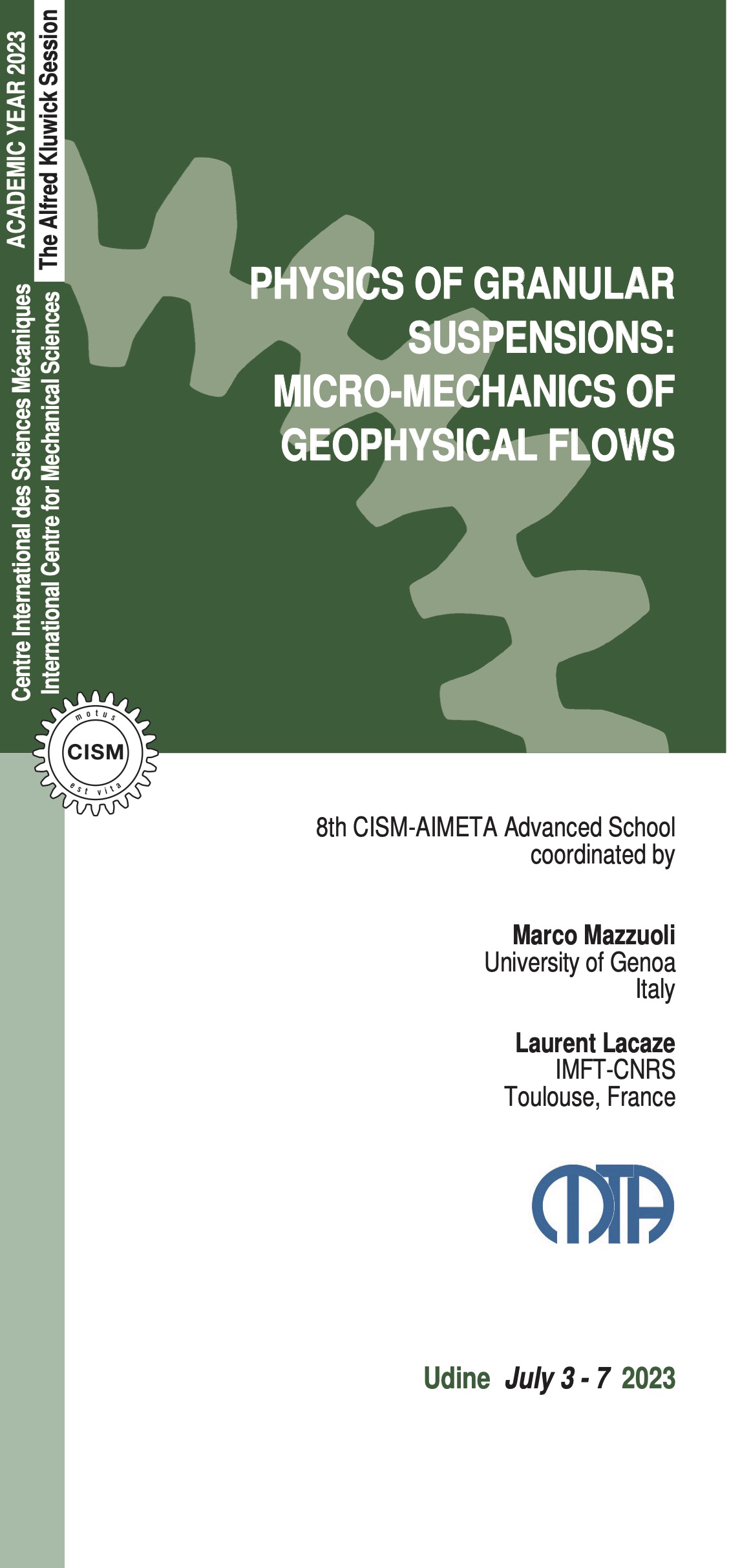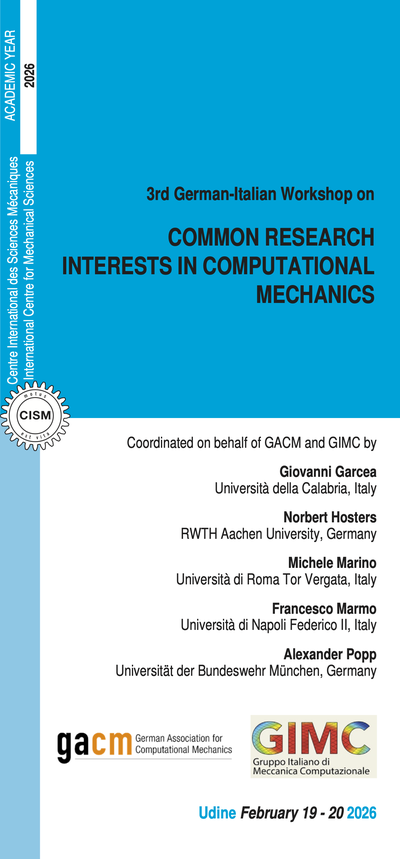The course is an exploration of the recent theoretical, experimental and numerical advancements in the modelling of non-Brownian granular suspensions. The quest is mainly motivated by the growing scientific and engineering interest in geophysical flows as a consequence of the climate change and the severe impact of hydro-geological catastrophic events on socio-economic activities. Among geophysical phenomena, the course focuses on water-saturated sub-aerial and sub-aqueous debris flows, hyper-concentrated flows, underwater turbidity currents, creeping and fluid-like movements of soil in landslides as well as on the sediment transport in rivers and along ocean shores, both at the bed and in suspension. Indeed, the presence of a liquid, which saturates the interstices between grains, formidably expands the parameter space of granular flows, the mixture exhibiting behaviours typical of either viscous shear-thinning fluids or dense granular flows depending essentially on the average distance between solid particles (i.e. the particle concentration), the relative velocity of particles and the electro-chemo-mechanical properties of the mixture components. The scope of the course is the investigation of the purely hydraulic problem, thus the liquid is water while particles are in general coarse and inert (non-colloidal and non-adhesive) and, therefore, only their mechanical properties are considered.
The opening of the course is devoted to highlighting the striking differences between (dry) granular flows and granular suspensions. Granular suspensions are first classified on the basis of the relative velocity of particles, namely of the particle Reynolds number, into “viscous” and “inertial”, which determines the nature of dominant fluid-solid interactions. Then, “dilute”, “semi-dilute” and “dense viscous suspensions” are distinguished, which differ in the number concentration of particles and, consequently, in the role of inter-particle contacts. The dynamics of the granular suspensions under different boundary/initial conditions as well as different driving forces are investigated and modelled highlighting the most recent advancements in the subject. Continuum and discrete approaches are considered. The continuum approach comprises a single-phase, also referred to as “single effective fluid”, or two-phases which indicates that the “theory of mixture” is adopted. As for the discrete approach, it necessarily requires the use of numerical methods to solve the fluid-particle-coupled continuity and momentum equations. The coupling and the inter-particle contacts can be obtained with a point-particle approach or, for “large particles”, by fully resolving the flow field around the particles. The effects due to the presence of turbulent vortices or to phase transition, when solid particles are in quasi-static conditions, are also considered. Finally, models are described and applied to the aforementioned geophysical flows.
Andreotti, B., Forterre, Y., Pouliquen, O., Granular media, Cambridge University Press, 2013.
Balachandar, S., A scaling analysis for point-particle approaches to turbulent multiphase flows. Int. J. Multiphase Flow, 35(9), 801-810, 2009.
Balachandar, S., Eaton, J.K., Turbulent dispersed multiphase flow, Annu. Rev. fluid mech., 2010.
Berzi, D., di Prisco, C.G., Vescovi D., Constitutive relations for steady, dense granular flows, Physical Review E, 2011.
Bougouin, A., Lacaze, L., Granular collapse in a fluid: Different flow regimes for an initially dense-packing. Physical Review Fluids, 3(6), 064305, 2018.
Charru, F., Bouteloup, J., Bonometti, T., Lacaze, L., Sediment transport and bedforms: a numerical study of two-phase viscous shear flow. Meccanica, 51(12), 3055-3065, 2016.
Chauchat J. and M. Médale, A three-dimensional numerical model for dense granular flows based on the rheology, J. Comput. Phys., Volume 256, 696-712, 2014.
Guazzelli, E., Morris, J.F., A physical introduction to suspension dynamics, Cambridge University Press, 2011.
Guazzelli, E., Pouliquen, O., Rheology of dense granular suspensions, J. Fluid Mech., 852, P1, 2018.
Ling, Y., Parmar, M., & Balachandar, S., A scaling analysis of added-mass and history forces and their coupling in dispersed multiphase flows. Int. J. Multiphase Flow, 57, 102-114, 2013.
Maurin, R., J. Chauchat and P. Frey, Dense granular flow rheology in turbulent bedload transport. J. Fluid Mech., 804, 490–512, 2016.
Mazzuoli, M., Uhlmann, M., Kidanemariam, A.G., Direct numerical simulations of ripples in an oscillatory flow. J. Fluid Mech., 863, 572-600, 2019.
Mazzuoli, M., Blondeaux, P., Vittori, G., Uhlmann, M., Simeonov, J., Calantoni, J., Interface-resolved direct numerical simulations of sediment transport in a turbulent oscillatory boundary layer. J. Fluid Mech., 885, 2020.
Vescovi, D., Marveggio, P., di Prisco, C.G., Saturated granular flows: constitutive modelling under steady simple shear conditions, Géotechnique, 2019.
Ouriemi M., Aussillous P., and Guazzelli E. 2009 Sediment dynamics. Part 1. Bed-load transport by laminar shearing flows, J. Fluid Mech. 636, 295-319.
Aussillous P., Chauchat J., Pailha M., Médale M., and Guazzelli E. 2013. Investigation of the mobile granular layer in bedload transport by laminar shearing flows, J. Fluid Mech. 736, 594-615.
Vowinckel, B., Biegert, E., Meiburg, E., Aussillous, P., and Guazzelli, E. 2021. Rheology of mobile sediment beds sheared by viscous, pressure-driven flows, J. Fluid Mech. 921, A20.
4 lectures on: From the dynamics at the particle scale towards the two-phase continuum approach; bedload sediment transport; beyond steady flows (Dilatancy effect and granular collapse in a fluid).
6 lectures on: Mechanisms, time and length scales of importance and statistical descriptions; Simulation approaches: Euler-Lagrange methods with fully-resolved physics; particle laden flows in geophysical applications: cutting edge approaches and what simulations offer; Eulerian two-phase flow simulations for gravity and turbidity currents.
5 lectures on: Numerical modeling for two-fluid approach; granular rheology in bed-load transport; turbulence-particle interactions in sediment transport problems; application to sand transport under waves: sheet-flow and vortex ripples; up-scaling of granular processes in larger scale problems (e.g. scour).
4 lectures on: Granular media under quasi-static conditions; phase transition in dry granular media.
Opening and 3 lectures on: rheology of granular suspensions.
5 lectures on: DEM method and coarse graining for granular flows; rheology extraction of granular/fluid/mixture phase in dense fluid particle flows; avalanche and debris flows: collapse as a laboratory model; from dense avalanche to turbidity currents; ripples and dunes.
4 lectures on: Direct numerical simulation (DNS) of sediment transport under non-breaking waves; rheological behaviour of unconsolidated granular bed subject to sea waves; DNS of marine sand ripples.
2 lectures on: Phase transition in granular suspensions.
ADMISSION AND ACCOMMODATION
The course is offered in a hybrid format giving the possibility to attend the course also by remote (on Microsoft Teams platform). On-site places are limited and assigned on first come first served basis.
The registration fees are:
On-site participation, 600.00 Euro + VAT*
This fee includes a complimentary bag, five fixed menu buffet lunches, hot beverages, downloadable lecture notes.
Deadline for on-site application is June 3, 2023.
Online participation, 250.00 Euro + VAT*
This fee includes downloadable lecture notes.
Deadline for online application is June 21, 2023.
Application forms should be sent on-line through the following web site: http://www.cism.it
A message of confirmation will be sent to accepted participants.
Upon request a limited number of on-site participants can be accommodated at CISM Guest House at the price of 35 Euro per person/night (mail to: foresteria@cism.it).
* where applicable (bank charges are not included) Italian VAT is 22%.
CANCELLATION POLICY
Applicants may cancel their registration and receive a full refund by notifying CISM Secretariat in writing (by email) no later than:
- June 3, 2023 for on-site participants (no refund after the deadline);
- June 21, 2023 for online participants (no refund after the deadline).
Cancellation requests received before these deadlines will be charged a 50.00 Euro handling fee. Incorrect payments are subject to Euro 50,00 handling fee.
GRANTS
A limited number of participants from universities and research centres who are not supported by their own institutions can request the waiver of the registration fee and/or free lodging.
Requests should be sent to CISM Secretariat by May 3, 2023 along with the applicant's curriculum and a letter of recommendation by the head of the department or a supervisor confirming that the institute cannot provide funding. Preference will be given to applicants from countries that sponsor CISM.





